The Role of Technology in Personal Health Management
In today’s digital era, technology plays a pivotal role in managing and enhancing personal health. From wearable devices to telemedicine platforms, technological advancements have significantly transformed the way individuals monitor, analyse, and improve their health and wellness. This article delves into various aspects of technology in personal health management, highlighting its impact, benefits, and future prospects.

Wearable Health Devices
Wearable devices have become increasingly popular for tracking physical activity, heart rate, sleep patterns, and more, providing users with valuable insights into their health status.
Fitness Trackers and Smartwatches
These devices offer a convenient way to monitor daily activity levels, exercise routines, and even stress levels, encouraging a more active and mindful lifestyle.
Health Monitoring Gadgets
Advanced gadgets, such as blood pressure monitors and glucose meters, seamlessly integrate with mobile apps, allowing for continuous health monitoring and data analysis.
Mobile Health Applications
Mobile health apps have revolutionized personal health management by offering tools for fitness tracking, nutrition logging, mental wellness, and medication reminders.
Comprehensive Health Platforms
Apps like MyFitnessPal and Headspace provide personalized recommendations and routines, making it easier for individuals to achieve their health and wellness goals.
Medication Management Apps
Applications like Medisafe assist in managing medication schedules, ensuring adherence to prescribed treatments and reducing the risk of missed doses.
Telemedicine and Virtual Consultations
Telemedicine platforms have made healthcare more accessible, enabling patients to consult with healthcare providers remotely, reducing the need for physical clinic visits.
Convenience and Accessibility
Virtual consultations offer a convenient solution for non-emergency medical advice, follow-ups, and mental health support, particularly beneficial for individuals with mobility issues or those living in remote areas.
Integration with Health Records
Many telemedicine services are integrated with electronic health records (EHR), allowing for a comprehensive view of the patient’s medical history and facilitating better-informed healthcare decisions.
Personal Health Records and Data Management
Technological solutions enable individuals to maintain a digital repository of their health information, making it easier to track progress and share relevant data with healthcare providers.
Cloud-Based Health Records
Platforms like Apple Health and Google Fit aggregate data from various sources, providing a holistic view of an individual’s health and fitness activities.
Data Privacy and Security
While these platforms offer significant benefits, they also raise concerns about data privacy and security, underscoring the importance of robust protection measures.
The Impact of Big Data and AI in Health Management
Big data analytics and artificial intelligence (AI) are at the forefront of personalizing health management strategies, offering predictive insights and personalized health recommendations.
Predictive Health Analytics
AI algorithms analyze vast amounts of health data to identify patterns and predict potential health issues before they manifest, enabling preventative measures.
Personalized Health Recommendations
AI-powered platforms can provide customized fitness and nutrition plans based on individual health data, preferences, and goals, enhancing the effectiveness of health management efforts.
The Future of Personal Health Technology
As technology continues to evolve, future innovations are expected to offer even more sophisticated tools for personal health management.
Integration of IoT in Healthcare
The Internet of Things (IoT) promises to further integrate health devices and systems, providing real-time health monitoring and automated interventions.
Advancements in Wearable Technology
Future wearable devices may offer more advanced health monitoring capabilities, such as non-invasive blood analysis and real-time disease detection.
Navigating Challenges and Ethical Considerations
Despite the numerous benefits, the integration of technology in health management poses challenges that need to be addressed, including issues related to data privacy, digital divide, and reliance on technology.
Ensuring Data Privacy and Security
As health data becomes increasingly digitized, ensuring the privacy and security of sensitive information is paramount to maintain trust and protect individuals’ rights.
Bridging the Digital Divide
Addressing the digital divide is crucial to ensure equitable access to health technology, particularly for underserved populations and communities.
Conclusion
Technology has undeniably transformed personal health management, offering tools that empower individuals to take control of their health and wellness. From wearable devices to AI-powered health platforms, technology provides valuable insights, convenience, and personalized recommendations that contribute to better health outcomes. As we navigate the future of health technology, it is essential to balance innovation with ethical considerations, ensuring that advancements in health management are accessible, secure, and beneficial for all.